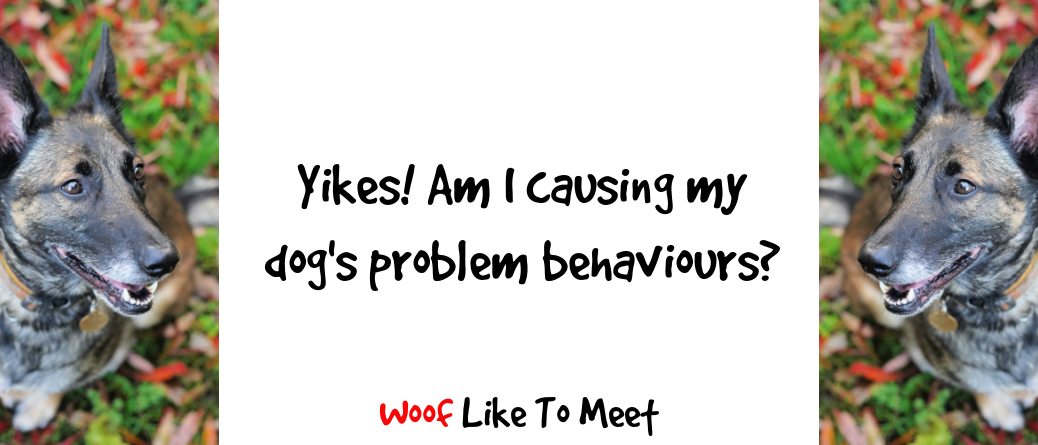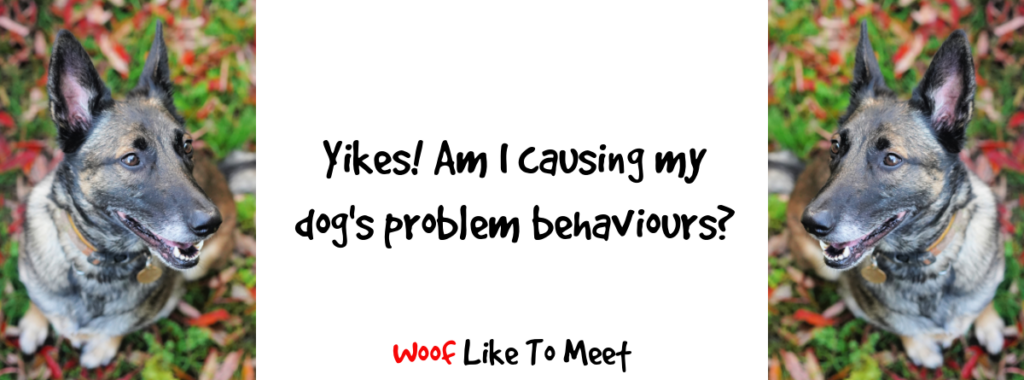I doubt that there is a single person in the world who thinks that they are either the direct cause or the indirect cause of their dog’s behaviour, but the reality is that there are numerous ways we can worsen our dog’s problem behaviours or even cause them. I want to take all the blame out of every single one of these because I’m absolutely sure that not a single one of us would like to think we’re worsening our dog’s problems and that we wouldn’t do better if we knew how.
So what type of behaviour am I talking about?
You name it… digging, escaping, barking, barking at the neighbours, trying to catch invisible flies, shadow chasing, self-mutilation, over-arousal, over-excitement, chasing animals on the TV, puppy and adolescent biting, separation related behaviour, fearfulness, reactivity and even aggression.
None of this is to say that it’s our fault. None of this is to say it’s actually things we could do anything about. This post isn’t about apportioning blame… it’s just an explanation of how we can sometimes contribute to our dog’s problems.
#1 Accidental cues
Cues are just signs for dogs. They tell dogs that stuff is about to happen and allow them to predict the things that come next. For instance, when I switch the lights out, my dogs head for the bedroom. They know what happens next. When I put my earphones in to start an online class, that’s a cue that I won’t be playing tug with them anymore. Cues show dogs that stuff will happen and that it won’t.
Generally speaking, this is not problematic for our dogs. We do hundreds of predictable things that help them work out what will happen.
Where it becomes a problem is where that cue releases an emotional cascade that only stops when another predictable thing happens. For instance, every morning when we get up, the first thing I do is take the dogs out. Thus, everything I do from waking up to brushing my teeth to putting my boots on (and especially putting my boots on!) adds to my dogs’ excitement because each thing I do is a cue that predicts a walk. The only thing that brings the excitement down is… going for the walk.
Likewise when I pick up my car keys. This is the cue that says the next predictable thing that will happen will be going on a car journey, which my dogs love. Thus, the longer between picking the keys up and getting out of the house, the more excitement, anticipation and frustration that causes, only stopping when we’re in the car and on our way.
It’s not all about good emotions, either. If I go out of the front door and shut it behind me, Lidy panics. She’ll then spend the intervening time trying to find ways to cope with her panic which is only brought to an end when I return.
Worse, for some of my clients and even for some of the dogs who’ve lived with me, that panic may be anxiety that isn’t based on the occurrence of a particular behaviour or event. For instance, lightning made Flika panic and generally her panic didn’t subside until well after any thunderstorms had stopped.
Dogs can be very good at backchaining too, where they pick up the previous cue in the chain. For example, it used to be just my boots that triggered excitement. Then it was putting my socks on before my boots. My dogs can’t be the only ones in the land who are delirious with joy when I go for a pee, I’m sure.
That’s the other thing… Dogs are very contextual learners, so they know the difference between that first toilet trip and the rest during the day. It’s not always true: I can’t even move my car keys without unleashing mayhem.
Our accidental cues can become triggers for behaviour that the dog cannot control. The more predictable they are, the harder it can be to reduce the behaviour. These accidental cues are often the problem behind separation-related behaviour but also behind excitement-related behaviour.
In trainer speak: is Pavlov causing your client problems?
#2 Accidental reinforcement
If dogs do stuff, I hate to say this out, but it’s probably because it’s reinforcing to them. It means that for one reason or another, that dogs do stuff that nets them specific things.
Not all of these specific things are good: it might help them escape or avoid stuff too.
Not all of these things are visible, either. Sometimes dogs do stuff because it helps calm themselves, it helps them manage their frustration or it helps them soothe themselves.
Dogs behave because that behaviour leads them to get stuff they want or need… when Lidy claws me with her great big paws, it’s because sometimes, it nets her affection and petting. When Heston comes and stares at me around 3:50, he knows more often than not, it nets him his dinner. Or, at least he thinks it does. Animals can have superstitious behaviours too.
Virtually all of my clients who have dogs with aggression issues have dogs who’ve found that aggression is very, very effective at making stuff NOT happen. Growling makes hands back off. Barking at the neighbours makes them spring back from the fence. Biting the vet is a quick way to stop them manipulating them. Nipping the groomer is a quick way to stop them grooming you.
If it worked, dogs are likely to do it again.
There can be very weird and wonderful behaviours that are reinforced by things we do. You perhaps wouldn’t think that a dog who barks at a window is actually doing it to get your attention.
Quick test: video your dog when you’re out and tell me if they react as frequently or as dramatically when you’re not there.
I know so many dogs whose alert and alarm barking at noises outside is very much connected to what the family do after the dog barks. It’s one reason I suspect that my alert and alarm barking protocol in the link above is very effective. The dog isn’t barking for food. They’re barking a) to make stuff stop in a superstitious fashion and b) they’re barking because they want us to notice the scary stuff.
Of course, it may not simply be our behaviour when dogs bark that gets our attention that’s causing the problem if your dogs bark less when you’re out. Remember that if you engage at all with the dog – if you physically interrupt them by moving them away, if you tell them off, if you pull them away, if you tell them how ace they are, if you look at them even – that’s all attention that can be altering what your dog does. Being told off is just attention to the dog. The other problem can be, though, that our presence is a confidence boost to an anxious or fearful dog. Our presence motivates the dog to bark when they wouldn’t if we weren’t there.
Even if you don’t reinforce the dog every single time, it can be really challenging to eradicate this behaviour, and the sporadic reinforcement actually makes it harder to kill the behaviour. One experiment in the 1970s with a chimpanzee had 1 reinforcer for 57000 behaviours. No, that’s not an error. That’s like you hitting the coffee machine button 57000 times to make a coffee come out.
Humans are so often involved in building behaviours, including if we’ve laughed at a dog for humping, if we’ve encouraged them, if we interact with them at all. I do know dogs who chase TV shapes or only bark at animal noises on TV when their guardian is there…. we simply have no comprehension of just how much our behaviour affects our dogs.
The quickest way to find out is to video your dogs when you’re not there but the triggers that cause the behaviour are there. In other words, what happens when the schoolkids next door go past the house when you’re not in. Does your dog still go nuts? What happens when people pass your car and you’re not in it. Does your dog still bark?
The saddest thing is that this can often happen with dogs who engage in stereotypical, compulsive or even self-mutilating behaviour. Sometimes, dogs can cause a lot of damage to themselves that is sometimes worsened by what we do when the dog is doing it. For one dog, every time he’d start snapping at invisible flies, the guardian would intervene. Video showed that the dog did it much less when the guardian wasn’t there. What that tells us is that what the guardian did was in some way reinforcing for the dog. For that specific guardian, they were interrupting the dog and inadvertently giving the dog a way to get their attention.
Alternatively, we can also be an accidental punisher. For instance, my boy Heston, since he started on phenobarbital two years ago, has become a stomach on legs. When I go out, he nips into the kitchen to help himself. Now I have never punished him for countersurfing or impromptu foraging, but the clear evidence is that, whether I like it or not, my presense inhibits his kitchen foraging.
In trainer speak: have you ruled out all reinforcement including human interaction, and have you ruled out human presence as an establishing event? Have you also ruled out if the human is acting as a purposeful or accidental punisher if the behaviour only happens in their absence?
#3 Accidental vacuums in guidance and training
Not vacuum cleaners. That would be weird.
Here, I’m talking about the fact that our dogs sometimes do stuff in lieu of guidance from us. In other words, they go Full Dog because we’ve not taught them how to not be Full Dog or because we’ve not given them other things to do.
You remember my tale about the mental spaniels who chased my car down the hill? That’s an accidental vacuum in both guidance and in training. Perhaps the dogs have never been taught what to do when something happens (and bless my little Lidy yesterday morning who is in the process of learning to stand between my legs when she sees a cat, who, as I was bent over trying to poop scoop holding a torch in my mouth – do NOT ask! – saw a cat and did that very thing, smashing the torch into my nose and causing me to drop both the poop and the poop bag and then the torch in the poop… and then expected a sausage for the privilege of ALL THE POOP ON EVERYTHING) or the dogs haven’t had guidance that said, ‘oh, you mean NOW as well??! Ok!’
Flika, for instance, would go nuts at any passing car that had the audacity to slow down in front of our house. If I didn’t call her away (with the purposeful reinforcer of biscuits, natch) she would happily run up and down along the gate barking.
In trainer speak: have you got competing schedules of reinforcement or has the behaviour not been proofed in a variety of contexts?
#4 Accidental lack of management
I’m guilty of this. In the car, we have two lengths of harness attachment for Lidy. One is short for sitting-up kind of journeys. It’s not long enough to let her lie down or move, but it’d stop her slamming around if I crashed. It keeps her on a literal short lead. Then there is a longer attachment for longer journeys so that she can lie down. That one, however, gives her more space to get into trouble should anyone stick a hand through Heston’s slightly open window. In other words, I don’t want her on a long attachment in the car should people get too close to the car. Yet sometimes I forget to switch from the long to the short if I pull up for petrol or for a snack break.
It’s human nature to give our dogs more freedom than we probably should. We let them off lead, we take them to the vet without a muzzle, we don’t have some kind of secure gate if the front door is open that stops our dogs dashing out into the garden. We get lucky more than we should, and we take our foot off the pedal. It can feel like we don’t trust our dog or that we’re not giving them adequate freedoms.
I always say they’re dogs. The only thing I trust is a very, very long training history. They’re going to be dogs, and we’re just lucky if nobody gets harmed as a result. Dogs gonna Dog. It’s up to us to manage it.
In trainer speak: is the dog living in a secure environment where there are two lines of protection?
#5 Accidental failure to acknowledge we’ve got a dog
This sounds terrible, doesn’t it? How do we forget we’ve got a dog?
Yet people do it all the time.
They also forget that they’ve got a specific breed or a specific type of dog, and that specific breed comes with specific behaviours that are more of a tendency than they’d want.
We forget to put in enough enrichment into our dogs’ daily lives. We forget that enrichment involves social needs and interactive play needs. Or we forget that our dogs have mental needs as well as physical needs.
We forget that our previous puppies were arseholes through their teen years. We forget how hard puppy training is.
Worse still, no matter how informed we think we are when we get our first dog as adults, we are never informed enough. We don’t know enough about canine body language, about canine needs, even about how to be around dogs. I have to say that I’ve benefited hugely from a more ‘Rural French’ approach to dog approaches. That’s to say, ‘you’ve got a dog, good for you… I’ll keep my hands to myself and stop staring at your dog’ instead of ‘How cute! You’ve got an enormous grumpy-looking German Shepherd. Can I pet him?
We are all learning.
In trainer speak: is your client skilled up enough about the dog they have and the lifestyle that would suit their dog?
#6 Accidentally putting our dog in past their coping level
I think this is one we’re all guilty of. We thought their training was better than it was. We thought their recall was more reliable. We thought they would cope with sitting at a café. We thought they would enjoy going for a walk with all our friends.
Whether we’re asking too much of our dogs’ current level of training, or whether we’re immersing the dog in situations they’re not yet ready for, this can be another way that we expect too much of our dogs and end up contributing to their behaviour.
I can’t tell you how many reactive dogs I’ve worked with, or dogs who are fearful in public, whose guardians haven’t quite got their head around the fact that the lead is the thing causing the problem because it interferes with the dog’s abilty to make good choices. This is not to say we should take the lead off. This is to say that we absolutely need to make safer choices for our dogs. Why would our dog feel the need to sort things out for themselves and navigate complex situations? Largely because we keep attaching a lead to them or trapping them within four walls and then exposing the dog to things they’re not yet ready for, but they can’t escape from.
In trainer speak: has your client accidentally been flooding the dog or working too quickly through stimulus gradients?
Conclusion
The point of this post is not to apportion blame. We feel guilty enough, I know. Accepting that our behaviour and our habits, our interactions with our dogs, our lack of training or guidance, our lack of management or our lack of awareness of our dog’s needs may be part of the dog’s problem can be a big enough ego burst. We think we’re doing such a great job and it’s pretty ugly when we look at what’s going on and realise we’re responsible for some of it.
I like to remind myself that much of this is just human nature to forget. Our lives with dogs are different and we’re all involved in the pursuit of knowledge that helps us help them lead more successful and enjoyable lives. Not a single one of us would like to admit that we are quite likely for our dog’s problem behaviour. Nobody’s sitting there wondering if they hadn’t laughed so much that first time their dog humped Uncle Eric, that Uncle Eric might not have been the first in a long line of humpees. Nobody is glad that they’ve turned their dog into a barking machine.
We’re not doing it on purpose.
But that’s not to say we don’t have to Adult the F*ck Up and accept our role in things. We’re grown ups. We can do this without crying in the corner for weeks. We don’t have to get out the hair shirts, the bells and the ashes. We can accept it and decide to do better in future. We’ve not got such fragile egos that we can’t cope in the slightest that *shock, horror* we may be in some way responsible for what our dogs do.
As Maya Angelou said, ‘When we know better, we do better’.
Now we know better, let’s do better.
If you’re a trainer and you hate having these kind of conversations with your clients, why not check out my book? It’s ace. I would say that, wouldn’t I? It’d make a good Christmas present for your dog trainer friends, too.
Available on Amazon in Kindle and paperback. Leave a review if you’ve already read it!



